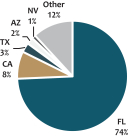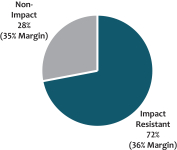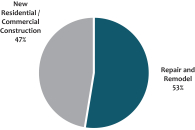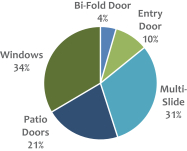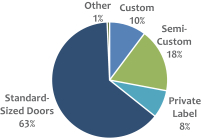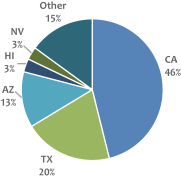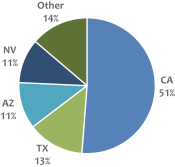Western Window Systems utilizes lean manufacturing techniques minimizing waste in the value stream and continuous improvement processes throughout the factory floor and within the office to optimize processes and eliminate fulfillment bottlenecks. Western Window Systems primarily operates on abuild-to-order production and fulfillment model. Due to thebuild-to-order oriented nature of its premium products, and its relatively short lead times of approximatelyfive-to-ten days for its Corporate Builder sales channel customers, Western Window Systems generally does not carry finished goods inventory other than its orders awaiting shipment. Most products are shipped via a dedicated and contracted common carrier, although others are utilized as needed. Western Window Systems also maintains anin-house fleet of five trucks for deliveries within Arizona, Nevada and California, and utilizes crate, freight and cargo containers for shipments to Hawaii as necessary.
Competition
The window and door industry is highly fragmented, and the competitive landscape is based on geographic scope. The competition generally falls into the following categories.
Local and Regional Window and Door Manufacturers: This group of competitors consists of numerous local job shops and small manufacturing facilities that tend to focus on selling products to local or regional dealers and wholesalers. Competitors in this group typically lack marketing support and the service levels and quality controls demanded by larger customers, as well as the ability to offer a full complement of products.
National Window and Door Manufacturers: This group of competitors tends to focus on selling branded products nationally to dealers and wholesalers and has multiple locations.
The primary competitors of Western Window Systems in the Custom sales channel include the following aluminum window manufacturers, all based on the West Coast of the U.S.: Fleetwood Windows & Doors, Heritage Aluminum, Panda, and La Cantina. In the Corporate Builder sales channel, several competitors to Western Window Systems have been introducinglow-cost competitive products, including WinDoor California, Avanti, and Cascade. In the emerging commercial space, Western Window Systems identifies EFCO, Arcadia, and Wasau as competitors.
The principal methods of competition in the window and door industry are the development of long-term relationships with window and door dealers and distributors, and the retention of customers by delivering a full range of high-quality products in a timely manner, while offering competitive pricing and flexibility in transaction processing. Trade professionals such as contractors, homebuilders, architects and engineers also engage in direct interaction with manufacturers and look to the manufacturer for training and education related to products and codes. Western Window Systems’ position as a leader in the market for premium, contemporary window, door and glass wall products, designed to unify indoor/outdoor living spaces, and the award-winning designs and quality of its products, as well as the relationships it has built with architects, builders and contractors to pull-through sales to its dealer-customers, is expected to position Western Window Systems to meet the needs of its customers and provide it with an advantage over its competitors.
Environmental Considerations
Although Western Window Systems’ business and facilities are subject to federal, state, and local environmental regulation, environmental regulation does not have a material impact on its operations, and it believes that its facilities are in material compliance with such laws and regulations.
35
